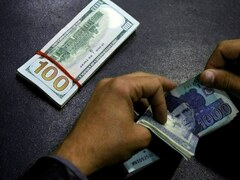Coronavirus testing capacity stands at 20,000 per day: Qureshi
- The minister said the Parliament had to play its vital role in the present crisis as was done in parliamentary democracies.
- It should give its input to implement the national strategy on COVID-19, he added.
- Qureshi said four million people were affected by the virus in 209 countries and 280,700 people died because of the disease.
 ISLAMABAD: Minister for Foreign Affairs Shah Mehmood Qureshi Monday said Pakistan's capacity for the coronavirus tests stood at 20,000 per day while the number of testing laboratories had been increased from 8 to 70.
ISLAMABAD: Minister for Foreign Affairs Shah Mehmood Qureshi Monday said Pakistan's capacity for the coronavirus tests stood at 20,000 per day while the number of testing laboratories had been increased from 8 to 70.
Opening the debate in the National Assembly on the coronavirus pandemic and its impact on the national economy, he said in total 283,000 tests had been conducted in Pakistan but the number was still low in proportion to the population.
Pakistan's testing capacity, he said, was the highest among the South Asian countries.
The minister said the Parliament had to play its vital role in the present crisis as was done in parliamentary democracies.
It should give its input to implement the national strategy on COVID-19, he added.
He noted that the challenge of coronavirus was unprecedented for Pakistan and the world.
The world would get rid of coronavirus when its cure or vaccine would be found in the next 18 to 20 months, while it was now trying to contain the disease.
Qureshi said four million people were affected by the virus in 209 countries and 280,700 people died because of the disease.
He said no government in the world, even those of the most developed countries, was prepared to tackle the pandemic when it struck.
Tens of thousands of people had died due to the disease in the United States, Italy, Spain, France and the United Kingdom, he added.
The minister said more than 660 people died in Pakistan, which had very fragile health facilities.
As of May 10, 29,000 people got infected while more than 8,000 recovered from the disease in the country, he added.
Qureshi recalled that when the first case of coronavirus was diagnosed in Karachi on February 26, the testing capacity of the country was for 100 tests per day.
He pointed out that the subject of health was devolved to the provinces in 2010, and since then for a decade the Pakistan Peoples Party had been in power in Sindh and the Pakistan Muslim League-Nawaz in Punjab.
The minister said the number of deaths in Pakistan were low as compared to the world average while the infection rate was also low against the predictions.
He said when the pandemic started the National Coordination Committee, and the National Command and Operation Center immediately started meetings, received input from all the provinces and took collective decisions.
As compared to other countries, Pakistan swiftly responded to the threat of coronavirus and the National Security Committee took unanimous decisions, he added.
The National Command and Control Center, he said, met daily and took updates from the provinces with the objective to build consensus.
"We are successfully implementing the national strategy on coronavirus."
He said air, rail and road transport among the provinces could not be started because of the reservations of provinces and the decision was delayed.
The minister criticised the mentality of Modi-led government in India for pursuing the Hindutva ideology and for blaming the Muslims for the spread of coronavirus.
He said under the Ehsaas Kilfalat Programme, Rs. 26 billion was given to 2.3 million families in Sindh.
The Federal Government, he said, initiated the economic stimulus programme to give financial assistance to the provinces.
Some 0.5 million protective suits and millions of masks were distributed among the provinces.
The minister said Rs. 75 billion was allocated to give money to those people, who lost their jobs, and relief in electricity bills was given to 7,000 commercial consumers and 40 industries.
He urged the opposition parties to rise above provincial considerations and act according to the national interest.
The government eased the lockdown at a time when other countries were also moving in the same direction, he remarked.
It was feared that the world economy would contract by three percent.
He said Pakistan was facing the twin challenges of protecting the people of Pakistan from hunger and poverty, and also slower and flatten the curve of number of infections.
Pakistan's economy, he added, could not afford a prolonged lockdown as it was feared that 18 million people would lose their jobs and 20 to 70 million could go below the poverty line.
He appreciated the efforts of Sindh Chief Minister Murad Ali Shah, but said he could not completely implement the lockdown in many areas of the province.
He said the government maintained the right to reimpose the lockdown if the number of infections went up fast.
The minister assured that stranded Pakistanis abroad would be brought back and sought cooperation of the provinces on the issue.
Shah Mehmood Qureshi said Indian Prime Minister Narendra Modi was committing atrocities against the Kashmiris.
Despite all what Modi was doing, Pakistan expressed its desire to sit and talk with India and participated in the health conference on the coronavirus, he added.






















Comments
Comments are closed.